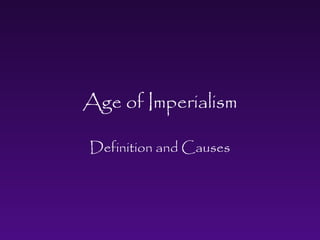
powerpoint.4
- 1. Age of Imperialism Definition and Causes
- 2. Imperialism Rule by a particular country over a diverse and different set of other, often distant, countries and peoples, generally as a result of military conquest “The Plum Pudding in Danger,” James Gillray, 1805 (Napoleon and Pitt carve up the world)
- 5. Why Empire? Economic Motives: • To make money by expanding and controlling foreign trade • To create new markets for products • To acquire raw materials and cheap labor • To export industrial technology and transportation methods
- 6. Why Empire? Political Motives: • To gain power by expanding territory • To compete with other European countries • To gain ports for their navies • To gain larger militaries by using native soldiers • To gain prestige by winning colonies • To boost national pride and security
- 7. Why Empire? Religious/Humanitarian Motives: • To spread Christianity • To protect European missionaries in other lands • To spread European values and moral beliefs • To educate peoples of other cultures/build schools • To heal the sick/build hospitals/improve sanitation
- 8. Why Empire? Exploratory Motives: • To explore “unknown” or uncharted territory • To conduct scientific research • To conduct medical searches for the causes and treatment of diseases • To go on an adventure • To investigate “unknown” lands and cultures
- 9. Why Empire? Ideological Motives: • Belief that the white race was superior and other cultures were “primitive” • Belief that Europeans should “civilize” peoples in other parts of the world • Belief that great nations should have empires and only the strongest nations will survive
- 10. Missionary school, Madagascar, ca. 1900
- 11. British cartoon “The Rhodes Colossus,” showing Cecil Rhodes’ vision of making Africa “all British from Cape to Cairo,” 1892
- 12. Diamond mining in Kimberley, South Africa, 1890
- 13. Henry Morton Stanley on an expedition to find Dr. Livingstone, who had disappeared in central Africa; at the mouth of the Ruizi River, 1872
- 14. Advertisement for Pears’ Soap from the 1890s
- 15. The “White Man’s Burden”
- 16. Two Sides • Promoters of empire - champion its merits and the benefits it brought to the colonizers and the colonized • Anti-imperialists - focus on humiliating battlefield defeats, political domination, economic exploitation, social disenfranchisement, and cultural alienation